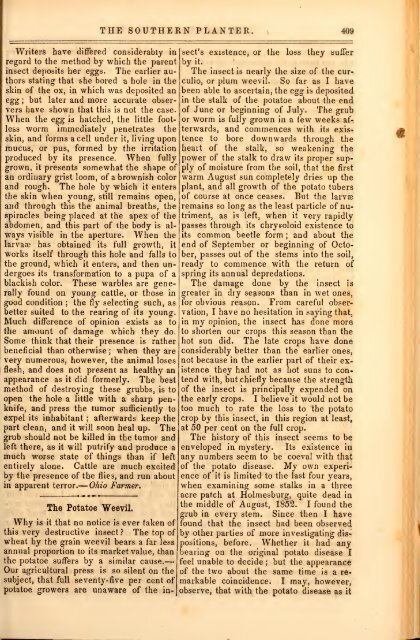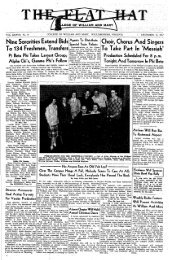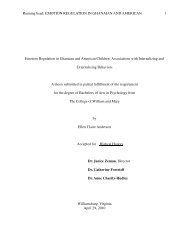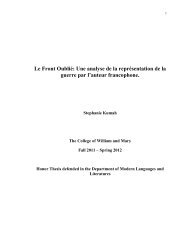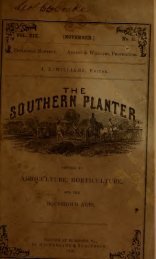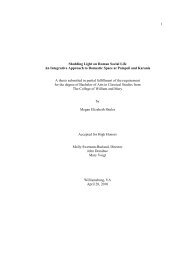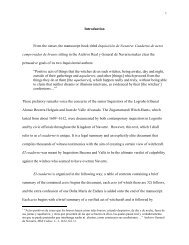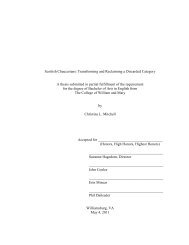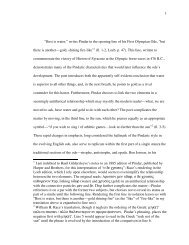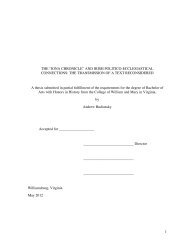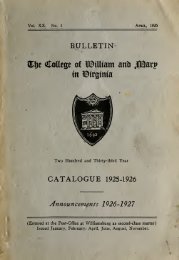Southern planter : devoted to agriculture, horticulture, and the ...
Southern planter : devoted to agriculture, horticulture, and the ...
Southern planter : devoted to agriculture, horticulture, and the ...
Create successful ePaper yourself
Turn your PDF publications into a flip-book with our unique Google optimized e-Paper software.
Writers have differed considerably in<br />
regard <strong>to</strong> <strong>the</strong> method by which <strong>the</strong> parent<br />
insect de})osits her eggs. The earlier authors<br />
stating that she bored a hole in <strong>the</strong><br />
skin of <strong>the</strong> ox, in which was deposited an<br />
i'gg ; but later <strong>and</strong> more accurate observers<br />
have shown that this is not <strong>the</strong> case.<br />
When <strong>the</strong> egg is hatched, <strong>the</strong> little foot-<br />
less worm immediately penetrates <strong>the</strong><br />
skin, <strong>and</strong> forms a cell under it, living upon<br />
mucus, or pus, formed by <strong>the</strong> irritation<br />
produced by its presence. When fully<br />
grown, it presents somewhat <strong>the</strong> shape of<br />
an ordinary grist loom, of a brownish color<br />
<strong>and</strong> rough. The hole by which it enters<br />
<strong>the</strong> skin when young, still remains open,<br />
<strong>and</strong> through this <strong>the</strong> animal breaths, <strong>the</strong><br />
spiracles being placed at <strong>the</strong> apex of <strong>the</strong><br />
abdomen, <strong>and</strong> this part of <strong>the</strong> body is always<br />
visible in <strong>the</strong> aperture. When <strong>the</strong><br />
larvaae has obtained its full growth, it<br />
works itself through this hole <strong>and</strong> falls <strong>to</strong><br />
<strong>the</strong> ground, which it enters, <strong>and</strong> <strong>the</strong>n undergoes<br />
its transformation <strong>to</strong> a pupa of a<br />
blackish color. These warbles are gene-<br />
rally found on young cattle, or those in<br />
good condition ; <strong>the</strong> fly selecting such, as<br />
better suited <strong>to</strong> <strong>the</strong> rearing of its young.<br />
Much difference of opinion exists as <strong>to</strong><br />
<strong>the</strong> amount of damage which <strong>the</strong>y do.<br />
Some think that <strong>the</strong>ir presence is ra<strong>the</strong>r<br />
beneficial than o<strong>the</strong>rwise ; when <strong>the</strong>y are<br />
very numerous, however, <strong>the</strong> animal loses<br />
flesh, <strong>and</strong> does not present as healthy an<br />
appearance as it did formerly. The best<br />
method of destroying <strong>the</strong>se grubbs, is <strong>to</strong><br />
open <strong>the</strong> hole a little with a sharp pen-<br />
knife, <strong>and</strong> press <strong>the</strong> tumor sufficiently <strong>to</strong><br />
expel its inhabitant ; afterwards keep <strong>the</strong><br />
part clean, <strong>and</strong> it will soon heal up. The<br />
grub should not be killed in <strong>the</strong> tumoi <strong>and</strong><br />
left <strong>the</strong>re, as it will putrify <strong>and</strong> produce a<br />
much worse state of things than if left<br />
entirely alone. Cattle are much excited<br />
by <strong>the</strong> presence of <strong>the</strong> flies, <strong>and</strong> run about<br />
in apparent terror.— Ohio Farmer.<br />
The Pota<strong>to</strong>e Weevil.<br />
—<br />
Why is it that no notice is ever taken of<br />
this very destructive insect? The <strong>to</strong>p of<br />
wheat by <strong>the</strong> grain weevil bears a far less<br />
annual proportion <strong>to</strong> its market value, than<br />
<strong>the</strong> pota<strong>to</strong>e suffers by a similar cause.<br />
Our agricultural press is so silent on <strong>the</strong><br />
subject, that full seventy-five per cent of<br />
pota<strong>to</strong>e growers are unaware of <strong>the</strong> in-<br />
THE SOUTHERN PLANTER. 409<br />
sect's existence, or <strong>the</strong> loss <strong>the</strong>y suffer<br />
by it.<br />
The insect is nearly <strong>the</strong> size of <strong>the</strong> curculio,<br />
or plum weevil. So far as I have<br />
been able <strong>to</strong> ascertain, <strong>the</strong> egg is deposited<br />
in <strong>the</strong> stalk of <strong>the</strong> pota<strong>to</strong>e about <strong>the</strong> end<br />
of June or beginning of July. The grub<br />
or worm is fully grown in a few weeks afterwards,<br />
<strong>and</strong> commences with its existence<br />
<strong>to</strong> bore downwards through <strong>the</strong><br />
heart of <strong>the</strong> stalk, so weakening <strong>the</strong><br />
power of <strong>the</strong> stalk <strong>to</strong> draw its proper supply<br />
of moisture from <strong>the</strong> soil, that <strong>the</strong> first<br />
warm August sun completely dries up <strong>the</strong><br />
plant, <strong>and</strong> all growth of <strong>the</strong> pota<strong>to</strong> tubers<br />
of course at once ceases. But <strong>the</strong> larvae<br />
remains so long as <strong>the</strong> least particle of nutriment,<br />
as is left, when it very rapidly<br />
passes through its chrysoloid existence <strong>to</strong><br />
its common beetle form ; <strong>and</strong> about <strong>the</strong><br />
end of September or beginning of Oc<strong>to</strong>-<br />
ber, passes out of <strong>the</strong> stems in<strong>to</strong> <strong>the</strong> soil,<br />
read}' <strong>to</strong> commence with <strong>the</strong> return of<br />
spring its annual depredations.<br />
The damage done by <strong>the</strong> insect is<br />
greater in dry seasons than in wet ones,<br />
for obvious reason. From careful obser-<br />
vation, I have no hesitation in saying that,<br />
in my opinion, <strong>the</strong> insect has done more<br />
<strong>to</strong> shorten our crops this season than <strong>the</strong><br />
hot sun did. The late crops have done<br />
considerably better than <strong>the</strong> earlier ones,<br />
not because in <strong>the</strong> earlier part of <strong>the</strong>ir existence<br />
<strong>the</strong>y had not as hot suns <strong>to</strong> contend<br />
with, but chiefly because <strong>the</strong> strength<br />
of <strong>the</strong> insect is principally expended on<br />
<strong>the</strong> early crops. I believe it would not be<br />
<strong>to</strong>o much <strong>to</strong> rate <strong>the</strong> loss <strong>to</strong> <strong>the</strong> pota<strong>to</strong><br />
crop by this insect, in this region at leasts<br />
at 50 per cent on <strong>the</strong> full crop.<br />
The his<strong>to</strong>ry of this insect seems <strong>to</strong> be<br />
enveloped in mystery. Its existence in<br />
any numbers seem <strong>to</strong> be coeval with that<br />
of <strong>the</strong> pota<strong>to</strong> disease. My own experience<br />
of it is limited <strong>to</strong> <strong>the</strong> last four years,<br />
when examining some stalks in a three<br />
acre patch at Holmesburg, quite dead in<br />
<strong>the</strong> middle of August, 1852. I found <strong>the</strong><br />
grub in every stem. Since <strong>the</strong>n I have<br />
found that <strong>the</strong> insect had been observed<br />
by o<strong>the</strong>r parties of more investigating dispositions,<br />
before. Whe<strong>the</strong>r it had any<br />
bearing on <strong>the</strong> original pota<strong>to</strong> disease I<br />
feel unable <strong>to</strong> decide ; but <strong>the</strong> appearance<br />
of <strong>the</strong> two about <strong>the</strong> same time is a remarkable<br />
coincidence. I may, however,<br />
observe, that with <strong>the</strong> pota<strong>to</strong> disease as it


